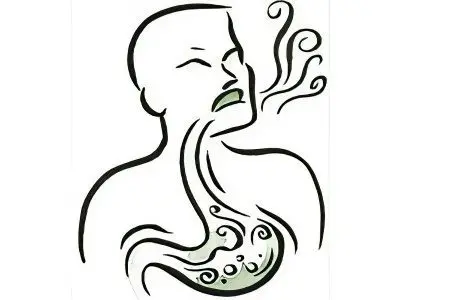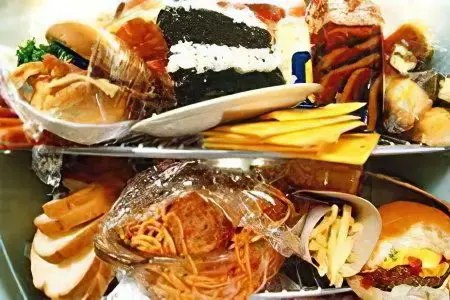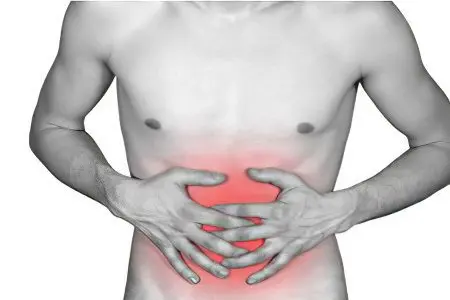Contents
Heartburn is a feeling of discomfort or a feeling of heat, a burning sensation behind the sternum, spreading upward from the epigastric (pit of the stomach) along the esophagus. The appearance of heartburn occurs periodically, mostly an hour after eating, especially if the food was plentiful and spicy. Less often, it occurs during physical exertion, when the body is tilted or in a horizontal position.
Usually, to relieve (stop) heartburn, it is enough to drink water, you can stop heartburn by taking antacids (substances that neutralize the action of acid). However, heartburn attacks can recur quite often and disrupt a normal lifestyle.
Heartburn, which disturbs a person more than three times a week, significantly impairs the quality of life. Although there is some relationship between the periods of heartburn, the duration of esophageal clearance, and the presence or absence of damage to the esophageal mucosa, it is not always clear enough. Some patients suffering from severe esophagitis (inflammation of the mucous membrane of the esophagus) do not complain of heartburn.
Heartburn can accompany gastritis with high acidity, peptic ulcer of the stomach and duodenum, cholecystitis, toxicosis of pregnant women, occurs with diaphragmatic hernia, intolerance to certain nutrients. If heartburn is combined with belching (especially sour), then this may be a sign of gastritis or stomach ulcers. If the pain worsens when lying down, then the problem is probably in the esophagus.
Causes of Heartburn

Causes of heartburn – increased acidity of the stomach, less often – a special sensitivity of the mucous membrane of the esophagus and stomach with low acidity. Heartburn is often accompanied by diseases of the stomach, but it can also occur with neuropsychiatric disorders after eating.
An unhealthy diet and lifestyle exacerbate heartburn and are among the most common causes.
Smoking, alcohol, carbonated drinks, coffee and hot spices in large quantities irritate the stomach lining, which leads to an increase in acid and relaxation of the gastric valve.
Heartburn provokes the use of large quantities of citrus fruits, tomatoes, various pickles, fresh bread, pies and fried foods.
Overeating leads to stretching of the stomach and provokes a copious release of acid.
Taking drugs such as aspirin, ibuprofen, ortofen and some others provokes an increase in acid production in the stomach and the reflux of acidic contents into the esophagus.
Wearing tight belts, lifting weights, pregnancy, being overweight contribute to an increase in intra-abdominal pressure, which leads to heartburn.
Sleep after eating can cause heartburn.
Stress, neuroses, especially those accompanied by anxiety, are also one of the reasons.
“Triggers” for heartburn

Food in large quantities, especially fatty.
Overweight.
Rest in a horizontal position after eating.
Smoking.
Alcohol.
Soda drinks.
Tumbles.
Chocolate.
Strong coffee and tea.
Medicines to lower blood pressure and relax smooth muscles.
Heartburn after every meal
Regular heartburn after eating should not be considered a separate problem. This unpleasant symptom mainly indicates diseases of the gastrointestinal tract.
A list of some diseases and conditions that cause heartburn after each meal:
peptic ulcer of the stomach or duodenum;
A hernia of the alimentary opening of the diaphragm, in which part of the stomach, and in some cases the intestinal loops, are displaced into the chest cavity through the alimentary opening in the lower part of the esophagus. With insufficient work of the locking mechanisms, the main concomitant symptom of this disorder is regular heartburn after eating;
Gastritis with hypersecretion, also accompanied by excruciating and persistent heartburn after eating, due to the penetration of the acidic contents of the stomach into the esophagus;
Duodenitis – inflammation of the duodenum;
Inflammation of the gallbladder (cholecystitis);
Obesity – excess fat in the abdominal cavity creates significant pressure inside the stomach, as a result, its contents enter the esophagus;
Gastro-esophageal reflux disease (GERD), in which the work of the lower esophageal sphincter is disturbed, and the contents of the stomach are regularly thrown into the esophagus;
The consequences of the removal of the gallbladder, part of the duodenum or stomach in the surgical treatment of peptic ulcer and gastric cancer are also the cause of the flow of juice containing liver and pancreatic enzymes into the esophagus;
Pregnancy, as well as obesity, leads to an increase in intragastric pressure. In addition, a change in the hormonal balance can also affect the adequate functioning of the lower esophageal sphincter and the gastrointestinal tract as a whole;
Angina pectoris is accompanied by specific pain, which can be confused with heartburn.
Regular heartburn after eating is a serious reason to consult a gastroenterologist. Self-treatment, in this case, is not permissible, as it can lead to dire consequences.
Heartburn and stomach pain

Almost all of the above conditions or diseases, with slight differences, can cause heartburn and stomach pain, consider them in more detail:
chronic hyperacid gastritis always accompanied by persistent heartburn, which appears as a result of the reflux of gastric juice containing acid into the esophagus, irritating and inflaming its mucous membrane. In some cases, heartburn can be the equivalent of pain that occurs one and a half to two hours after eating;
duodenitis – pains are felt constantly, but especially worse after eating with “errors” in the diet, heartburn is their faithful companion. However, pain gradually decreases, but heartburn and bloating remain and, of course, negatively affect the quality of life;
chronic cholecystitis characterized by a combination of heartburn, and pain in the right upper part of the stomach. As a rule, they occur after eating fatty foods or shaking while driving;
a peptic ulcer. Heartburn and stomach pain can also indicate this disease;
hernia of the food opening of the diaphragm. In this case, pain appears when a person assumes a horizontal position or when bending over. It is localized in the stomach and can radiate to the region of the heart or to the back and be accompanied by heartburn, but pain disappears as soon as a person assumes an upright position;
GERD also accompanied by pain in the upper part of the stomach and heartburn;
pregnancy. A companion of this condition can be gastritis with high acidity, accompanied by all the characteristic symptoms;
digestive disorders. Most often, causeless pain in the stomach, accompanied by heartburn, belching, and sometimes nausea, is the lot of the young. They can be caused by a violation of the contraction of the walls of the gallbladder, intestines or stomach, as well as the production of excessive amounts of acid.
Feeling of heartburn in the throat
This phenomenon occurs due to the ingress of gastric juices on the mucous membrane of the esophagus in case of violations of the motility of the duodenum, stomach or esophagus, when its lower sphincter does not work adequately.
The pH of the esophageal walls is at a neutral level, and the acid contained in the gastric juice irritates and burns the esophageal mucosa.
Acid provokes inflammation, which can lead to erosions and ulcers of the esophagus. The result can be bleeding, and in some severe cases, even life-threatening ruptures of the walls of the esophagus.
Scarring of ulcers leads to a narrowing of the esophagus, in which a person feels an impassable lump in the throat and has difficulty swallowing food. This condition not only brings discomfort to life, but can also become an indication for a complex operation and increases the risk of developing esophageal cancer.
Feelings of heartburn in the throat can also be experienced by perfectly healthy people with various dietary disorders. However, seizures in such cases are extremely rare.
Pregnant women, as mentioned above, also suffer from heartburn very often. Heartburn attacks are typical for the second half of pregnancy, when a large fetus presses on the esophageal sphincter, slightly opening it.
How to get rid of heartburn?

The recipes below can be used to relieve heartburn attacks, or used as an aid in the treatment of digestive disorders associated with heartburn. But they cannot replace the main treatment prescribed by a specialist.
Almond. As strange as it sounds, almonds are able to neutralize stomach acid. Chewing this nut thoroughly is a very effective remedy for an attack of heartburn. Almonds should be doused with boiling water to make the skin easier to remove and chew. A little patience – and heartburn “will take off like a hand” [source]. It is recommended to soak almonds for 12 hours in water before drinking.
Bananas. Eating a banana can actually help cure heartburn in the same way that almonds can. Banana contains natural anti-acids.
Ginger. Ginger can relieve nausea and also reduce heartburn. You can add grated ginger to your prepared meals or make ginger tea.
Chewing gum. According to a 2014 study, chewing gum within half an hour of eating may also help reduce heartburn. Gum, which contains bicarbonate, is particularly effective.
Soda. Baking soda can help you neutralize hydrochloric acid in your stomach and relieve heartburn symptoms (1/2 teaspoon (flat) in a glass of water). It is very important to drink soda slowly, in small sips! If you drink it quickly, then the situation will worsen (a new release of hydrochloric acid from the stomach).
Flax-seed. Pour half a glass of boiling water over a teaspoon of the seed. It is more convenient to cook in the evening so that the infusion is ready in the morning. Before drinking, bring the volume of the resulting drink to a full glass and drink on an empty stomach for at least 14 days. You can use a simpler recipe. Grind flax seeds and, as soon as heartburn begins, pour a teaspoon of the powder with a glass of warm water and drink in small sips.
Mushroom is a child. Another excellent adjunct in the treatment of diseases of the digestive tract is birch fungus or chaga (befungin is produced on the basis of chaga). How to grow chagu mushroom?
What to do with severe heartburn?

Home remedies are definitely good. But what to do when severe heartburn “attacks” at the very moment when there is not enough time to prepare infusions and decoctions, it will also not work to urgently get an appointment with a doctor, but you need relief right now?
Pharmaceutical preparations called antacids will come to the rescue:
Rennie,
Phosphalugel,
Almagel,
Gaviscon,
Maalox and other drugs.
But, we should not forget about their side effects: constipation, diarrhea and other unpleasant consequences. In addition, they flush out calcium from the body.
Therefore, we strongly recommend that you do not self-medicate frequent heartburn. It is better to consult a doctor, undergo a detailed examination and carry out the correct treatment.
Diet for heartburn

Let’s figure out which foods should be preferred for heartburn, and which foods should be discarded.
Steamed dishes, as well as baked and boiled vegetables are much healthier:
carrot,
potatoes,
peas,
lentils.
It is necessary to include products containing complex carbohydrates in the menu:
durum wheat pasta;
bran or corn bread,
brown rice.
Your “correct” diet will be incomplete without:
fat-free cheeses, sour cream and cottage cheese;
fish;
lean meat;
hard-boiled or soft-boiled eggs;
various cereals: semolina, buckwheat, oatmeal;
apples and bananas;
non-carbonated mineral water (preferably alkaline), compote of non-acidic berries and fruits, green tea.
What will you have to sacrifice:
fried, salty, spicy and greasy, no “sliced bacon” or bacon;
fat sour cream, cottage cheese, kefir;
oranges, limes and lemons. They contain an acid that contributes to a significant increase in the acidity of the stomach;
baking and confectionery;
chocolate;
hot spices and seasonings;
scrambled eggs and fried omelet;
tomato paste;
strong coffee and tea;
alcohol;
carbonated drinks.
But diet is half the battle. Heartburn can be caused by overeating. Food must be eaten correctly:
Eat small meals, but often, 5-6 times a day.
The process itself should be leisurely, allowing you to thoroughly chew food.
Last meal no later than 19.00.
For at least 40 minutes after eating, you should not take a horizontal position.
It is necessary to drink about 2 liters of water per day, evenly distributing this amount.
Tips for heartburn
How to avoid heartburn? Here are some tips:
during meals, drink mineral water without gas, it will wash away the acid from the walls of the esophagus;
try to eat more often, but in small portions;
limit yourself to the above products that provoke heartburn;
follow the rules for taking medicines;
if you feel the need to lie down after eating, then raise the headboard by 10–15 cm;
in neurotic states, a psychologist or psychotherapist will help;
If your heartburn is persistent, you should see a doctor.
Be attentive to your health. Listen to yourself. After all, such a symptom as heartburn can be a signal of dangerous diseases.









